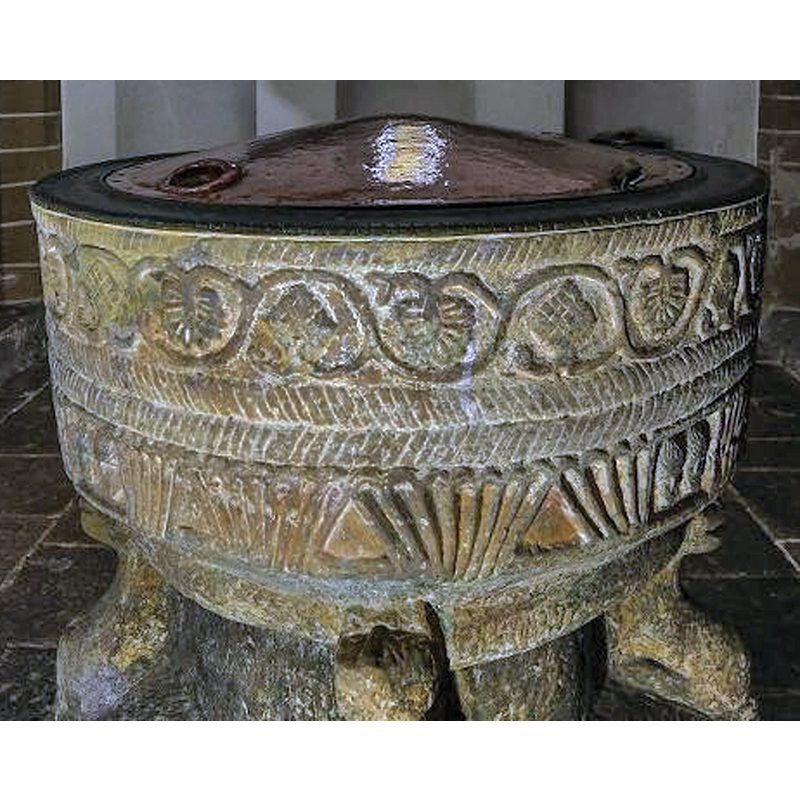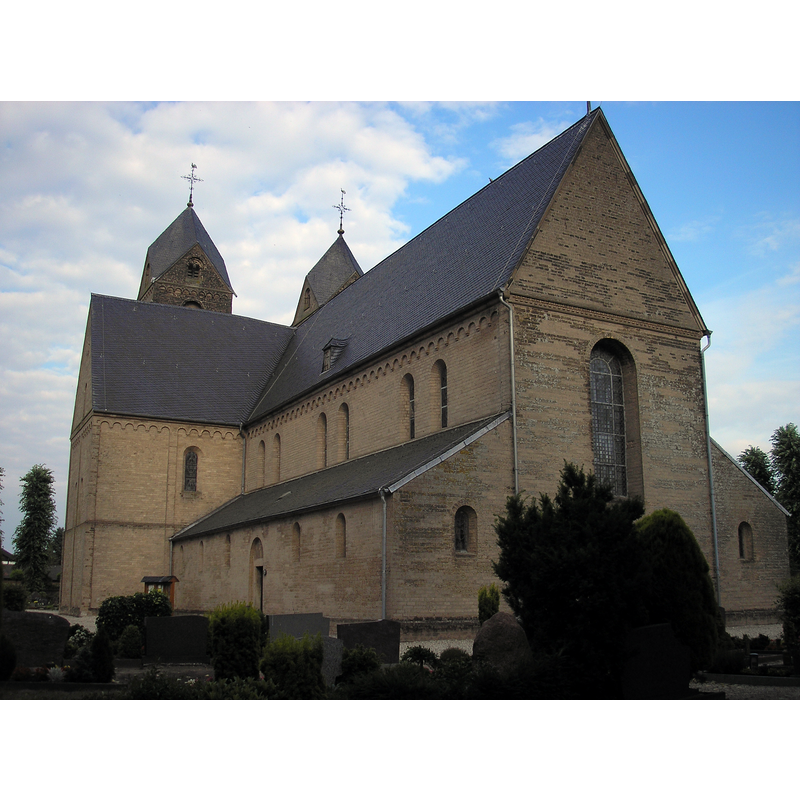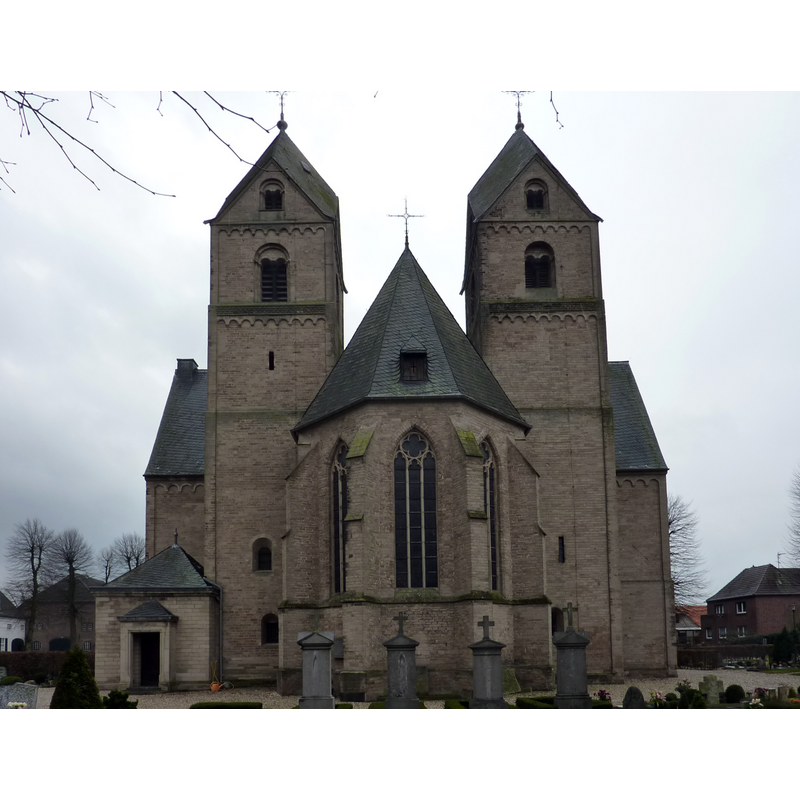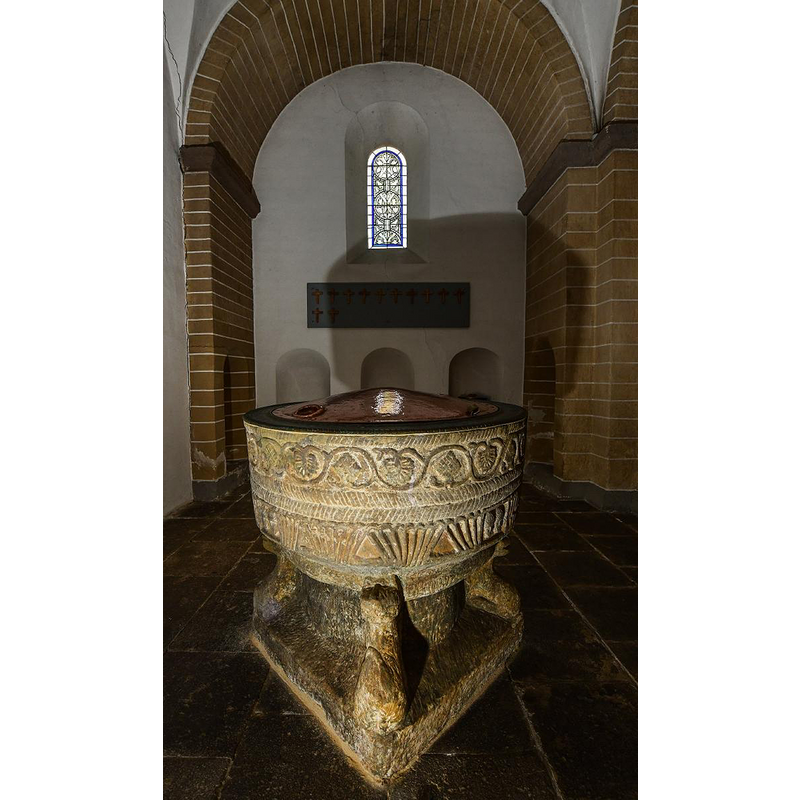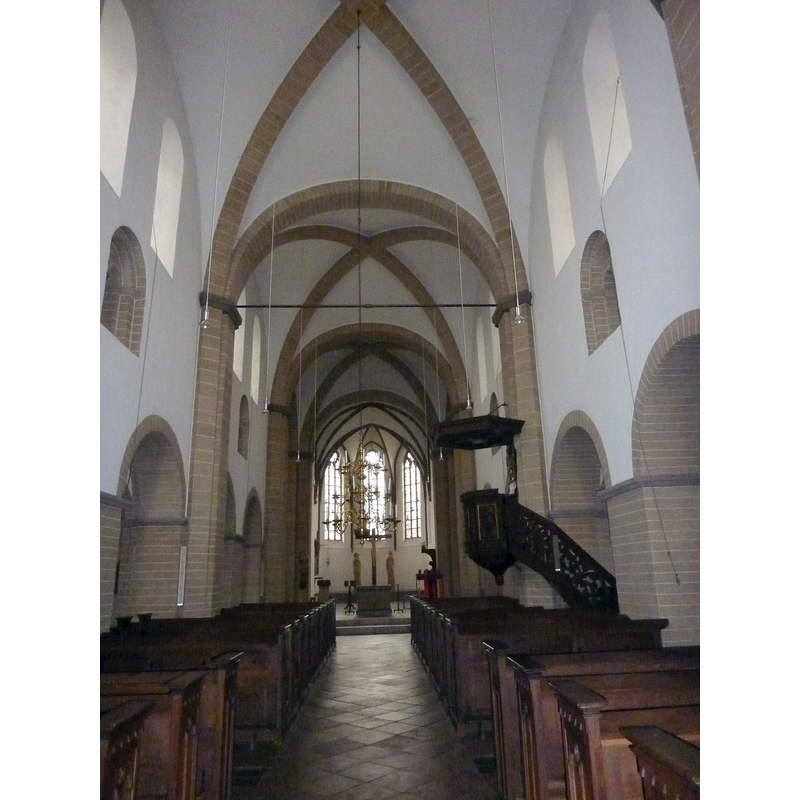Wissel / Wisceloh
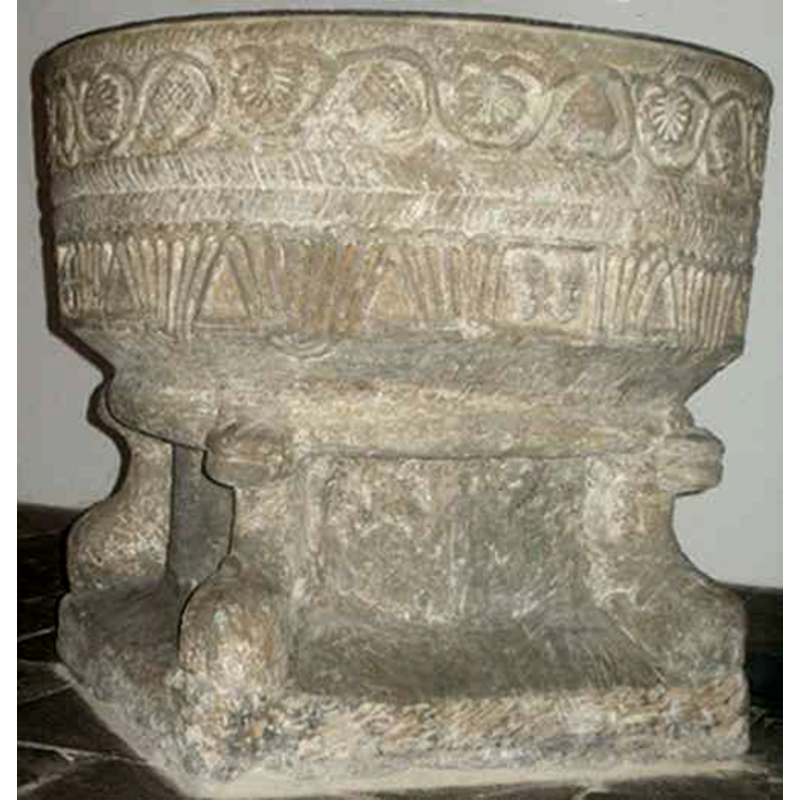
Image copyright © Pieter Delicaat, 2007
GFDL / CC-BY-SA-3.0
Results: 17 records
view of font
Copyright Statement: Image copyright © Pieter Delicaat, 2007
Image Source: digital photograph taken in 2007 by Pieter Delicaat [http://commons.wikimedia.org/wiki/File:Wissel_Clemenskirche_zandstenen_doopvont_PM07.jpg] [accessed 28 March 2010]
Copyright Instructions: GFDL / CC-BY-SA-3.0
view of basin and cover
Copyright Statement: Image copyright © Gottfried Evers, 2019
Image Source: edited detail of a digital photograph 18 October 2019 by Gottfried Evers, in RP.Online [https://rp-online.de/nrw/staedte/goch/serie-taufsteine-der-romanische-taufstein-von-wissel_aid-46544227] [accessed 1 February 2022]
Copyright Instructions: No known copyright restriction / Fair Dealing
design element - motifs - vine - grapevine - bearing fruit
Copyright Statement: Image copyright © Pieter Delicaat, 2007
Image Source: digital photograph taken in 2007 by Pieter Delicaat [http://commons.wikimedia.org/wiki/File:Wissel_Clemenskirche_zandstenen_doopvont_PM07.jpg] [accessed 28 March 2010]
Copyright Instructions: GFDL / CC-BY-SA-3.0
human figure - child - head - 8?
Scene Description: in pairs inscribed in rectangular frames, among the fan-palmettes
Copyright Statement: Image copyright © Pieter Delicaat, 2007
Image Source: digital photograph taken in 2007 by Pieter Delicaat [http://commons.wikimedia.org/wiki/File:Wissel_Clemenskirche_zandstenen_doopvont_PM07.jpg] [accessed 28 March 2010]
Copyright Instructions: GFDL / CC-BY-SA-3.0
design element - patterns - fan-frieze
Copyright Statement: Image copyright © Pieter Delicaat, 2007
Image Source: digital photograph taken in 2007 by Pieter Delicaat [http://commons.wikimedia.org/wiki/File:Wissel_Clemenskirche_zandstenen_doopvont_PM07.jpg] [accessed 28 March 2010]
Copyright Instructions: GFDL / CC-BY-SA-3.0
design element - motifs - braid or double rope
Copyright Statement: Image copyright © Pieter Delicaat, 2007
Image Source: digital photograph taken in 2007 by Pieter Delicaat [http://commons.wikimedia.org/wiki/File:Wissel_Clemenskirche_zandstenen_doopvont_PM07.jpg] [accessed 28 March 2010]
Copyright Instructions: GFDL / CC-BY-SA-3.0
view of church exterior - northwest view
Copyright Statement: Image copyright © [in the public domain]
Image Source: digital photograph taken 13 June 2008 by MiraculixHB [https://commons.wikimedia.org/wiki/File:Wissel_stiftskirche.JPG] [accessed 29 November 2015]
Copyright Instructions: PD-self
view of church exterior - east view
Copyright Statement: Image copyright © Chris06, 2013
Image Source: digital photograph taken 6 December 2013 by Chris06 [https://commons.wikimedia.org/wiki/File:St._Clemens_(Wissel)_(10).JPG] [accessed 29 November 2015]
Copyright Instructions: CC-BY-SA-3.0
view of font and cover in context
Copyright Statement: Image copyright © Gottfried Evers, 2019
Image Source: digital photograph 18 October 2019 by Gottfried Evers, in RP.Online [https://rp-online.de/nrw/staedte/goch/serie-taufsteine-der-romanische-taufstein-von-wissel_aid-46544227] [accessed 1 February 2022]
Copyright Instructions: No known copyright restriction / Fair Dealing
view of church interior - nave - looking east
Copyright Statement: Image copyright © Chris06, 2013
Image Source: digital photograph taken 6 December 2013 by Chris06 [https://commons.wikimedia.org/wiki/File:St._Clemens_(Wissel)_(1).JPG] [accessed 29 November 2015]
Copyright Instructions: CC-BY-SA-3.0
design element - motifs - roll moulding
Copyright Statement: Image copyright © Pieter Delicaat, 2007
Image Source: digital photograph taken in 2007 by Pieter Delicaat [http://commons.wikimedia.org/wiki/File:Wissel_Clemenskirche_zandstenen_doopvont_PM07.jpg] [accessed 28 March 2010]
Copyright Instructions: GFDL / CC-BY-SA-3.0
animal - mammal - lion - sejant-gardant - 4
Scene Description: although they look like moulded buttresses they are a stylised rendering of lions
Copyright Statement: Image copyright © Pieter Delicaat, 2007
Image Source: digital photograph taken in 2007 by Pieter Delicaat [http://commons.wikimedia.org/wiki/File:Wissel_Clemenskirche_zandstenen_doopvont_PM07.jpg] [accessed 28 March 2010]
Copyright Instructions: GFDL / CC-BY-SA-3.0
view of font and cover
Copyright Statement: Image copyright © Groenling, 2008
Image Source: digital photograph taken 8 October 2008 by Groenling [http://www.flickr.com/photos/ana_sudani/2945110640/in/pool-fonts] [accessed 28 March 2010]
Copyright Instructions: PERMISSION NOT AVAILABLE -- IMAGE NOT FOR PUBLIC USE
view of basin - detail
Scene Description: the fourth of four pairs of children's heads between the palmettes on the basin side
Copyright Statement: Image copyright © Groenling, 2008
Image Source: detail of a digital photograph taken 8 October 2008 by Groenling [http://www.flickr.com/photos/ana_sudani/in/pool-fonts] [accessed 28 March 2010]
Copyright Instructions: PERMISSION NOT AVAILABLE -- IMAGE NOT FOR PUBLIC USE
view of basin - detail
Scene Description: the third of four pairs of children's heads between the palmettes on the basin side
Copyright Statement: Image copyright © Groenling, 2008
Image Source: detail of a digital photograph taken 8 October 2008 by Groenling [http://www.flickr.com/photos/ana_sudani/in/pool-fonts] [accessed 28 March 2010]
Copyright Instructions: PERMISSION NOT AVAILABLE -- IMAGE NOT FOR PUBLIC USE
view of basin - detail
Scene Description: the second of four pairs of children's heads between the palmettes on the basin side
Copyright Statement: Image copyright © Groenling, 2008
Image Source: detail of a digital photograph taken 8 October 2008 by Groenling [http://www.flickr.com/photos/ana_sudani/in/pool-fonts] [accessed 28 March 2010]
Copyright Instructions: PERMISSION NOT AVAILABLE -- IMAGE NOT FOR PUBLIC USE
view of basin - detail
Scene Description: the first of four pairs of children's heads between the palmettes on the basin side
Copyright Statement: Image copyright © Groenling, 2008
Image Source: detail of a digital photograph taken 8 October 2008 by Groenling [http://www.flickr.com/photos/ana_sudani/in/pool-fonts] [accessed 28 March 2010]
Copyright Instructions: PERMISSION NOT AVAILABLE -- IMAGE NOT FOR PUBLIC USE
INFORMATION
Font ID: 02577WIS
Object Type: Baptismal Font1
Font Century and Period/Style: 12th - 13th century, Romanesque
Workshop/Group/Artisan: Bentheim font, Berge b. Type II [Drake]
Church / Chapel Name: Kollegiatstiftskirche Sankt-Clemens / Katholische Pfarrkirche St. Clemens / Stiftskirche St. Clemens
Font Location in Church: Inside the church
Church Patron Saint(s): St. Clement
Church Notes: built ca.1150?; first documented 1167
Church Address: Dorfstraße 19, 47546 Kalkar-Wissel, Germany -- Tel.: : +49 2824 6587
Site Location: Düsseldorf, Nordrhein-Westfalen, Germany, Europe
Directions to Site: Located off (S) the E35, N of Kalkar
Ecclesiastic Region: Bistum Münster
Font Notes:
Click to view
Medieval baptismal font listed in Drake (2002) as a baptismal font of the "Bentheim School, Berge b. Type II", a group of fonts that includes those at Alfhausen, Badbergen, Bippen, Borken, Heek, Lathen, Nordherringen, Salzbergen, Schapen, Schepsdorf, Südkirchen, Utrecht (Katharinenkonvent), Weerselo, Wettringen and Wissel. Baptismal font consisting of a round basin with tapering sides bearing three bands of decoration: at the top is a vine with fruit, perhaps grape; in the middle is a double rope motif; at the bottom is a band that contains four (?) pairs of human heads in a row of pamlmettes the end of which wraps around the edge of the underbowl chamfer; there is a roll moulding in the centre-ring position, with what looks at first sight as moulded piping at 90-degree angles around a circular stem, linking it to the square lower base, but they are most likely very stulised renderings of seated lions, much used in the bases of many Bentheim fonts; despited the different volumes, the font appears monolithic. Described and illustrated in Werner Stalder's Kalkar-Wissel Die Bedeutung der Taufe kommt im Aufbau und in der Ornamentik des schweren romanischen Taufsteins symbolhaft zum Ausdruck, in the RP.Online editionof 18 October 2019 [https://rp-online.de/nrw/staedte/goch/serie-taufsteine-der-romanische-taufstein-von-wissel_aid-46544227] [accessed 1 February 2022]: The Romanesque font in the Church of St. Clemens is one of the oldest and most beautiful works of art in the Wissel Church. Like the church building, the baptismal font belongs to the middle of the 12th century. The material is hard, yellow sandstone from Bentheim. A number of similar baptismal fonts form the so-called Bentheim type, which also includes a baptismal font in the Archbishop's Museum in Utrecht. A flat, cylindrical basin rests on a short round column above a square footplate that rises towards the center. Four lions arranged at a corner, with tails laid over their backs and heads pointing outwards, help to support the pelvis. They lean against the pillar and support the annular bead with an upper slope that takes up the roundness of the basin. The flat, ornamental decoration with remnants of the original color is divided into two zones. The lower one is made up of bundled, stylized palm leaves, interrupted four times by two small (children’s?) heads, above two rope rods running in opposite directions. The original meaning of baptism is symbolically expressed in the structure and ornamentation of these early baptismal fonts. The basin holding the consecrated water is separated from the demons of evil belonging to the earth by the two ropes. The upper zone bears a frieze in the form of a vine tendril that ends with two rope rods. The loss of the upper rod was compensated for by a correspondingly designed rim made of bronze, which forms the support of the cover (1988). In an unspecified report is said: “The font is 87 cm high. The object to be restored is a Romanesque font of the Bentheim type. The font consists of a round basin and a square base. The basin, which tapers slightly towards the bottom, is adorned by two ornamentally designed bands that are separated by two corrugated round bars. The upper band shows a tendril alternating between grape and palmette leaf. The lower band shows a simple palmette frieze, which is separated into four similar looking parts by four lower panels. There are two heads on each panel. This basin is supported by four roughly crafted animals that are located on the corners of the square base plate. A ring connects the heads of the animals. The font is painted a dull gray-green oil paint. The leaves of the upper band are set off in a darker green. The paint has flaked off in many places. There is also impact damage, especially on the upper edge of the font. In some cases, this damage, as well as the cracks that were also present, were supplemented and repaired with a very hard plaster. Previous investigations showed that only a few original color particles could be found, the extent to which they belong together is unknown, and only complete exposure can provide information. Only then will it be found out whether these remains are the original version. I therefore recommend careful chemical and mechanical removal of the plaster surface that is now visible. If, after this work, it turns out whether the paint remains are the original version, then further work must be agreed with the client and the monument preservation commission.” The baptismal font stood in the south transept until 1962 and was then moved under Pastor Joseph Bausch in the last yoke of the west aisle. During this time, the heavily damaged cylindrical lid was replaced by a flat copper lid. The design and execution was carried out by Alfred Sabisch from Kalkar.
Credit and Acknowledgements: We are grateful to Pol Herman for his help in documenting this font
COORDINATES
UTM: 32U 312817 5739104
Latitude & Longitude (Decimal): 51.771472, 6.286944
Latitude & Longitude (DMS): 51° 46′ 17.3″ N, 6° 17′ 13″ E
MEDIUM AND MEASUREMENTS
Material: stone, sandstone (Bentheim)
Number of Pieces: one?
Font Shape: round, mounted
Basin Interior Shape: round
Basin Exterior Shape: round
Font Height (less Plinth): 87 cm*
Notes on Measurements: * [cf. FontNotes]
LID INFORMATION
Date: modern
Material: metal
Apparatus: no
Notes: low-dome; made by Alfred Sabisch of Kalkar
REFERENCES
- Drake, Colin Stuart, The Romanesque Fonts of Northern Europe and Scandinavia, Woodbridge, Suffolk: Boydell Press, 2002, p. 74, 177
